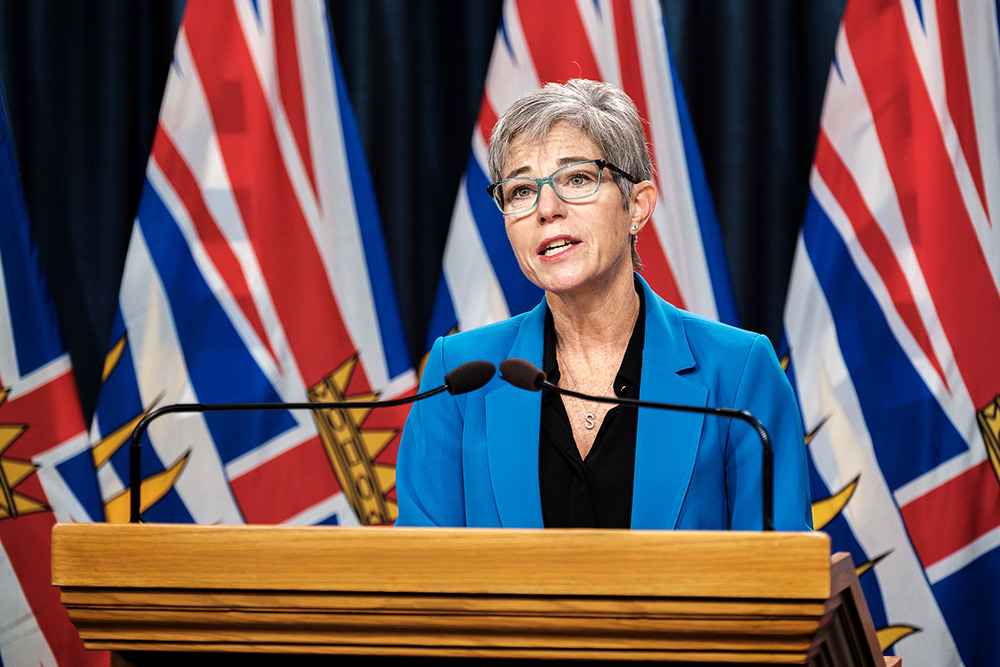The $300 a month added to income and disability assistance cheques in British Columbia during the pandemic has meant a lot to Michael Richards, so he’s frustrated with the government cutting the supplement in half, even though he’ll be eligible for a one-time recovery benefit payment in the short term.
“The increase has let me be able to pay for prescriptions that are not covered by Fair PharmaCare,” said Richards, a 45-year-old in Victoria who has been receiving B.C. disability assistance since 2014.
“Being able to choose to pay for my dog’s vet bills and being able to pay for groceries in the same month. That’s what the $300 has meant to me.”
Since the supplement was introduced in April, single people with disabilities have been eligible for $1,535.42 a month, which Richards notes is still well below the poverty line and far too low to make average Victoria rents affordable.
On Tuesday, the B.C. government announced people can apply online starting Dec. 18 for recovery benefits the NDP promised during the election.
Individuals who made less than $62,500 in 2019 — which would include anyone like Richards who was on social assistance — are eligible for a one-time $500 payment, with reduced amounts for people making up to $87,500 a year.
Finance Minister Selina Robinson said people receiving income or disability assistance can claim the recovery benefit without it being clawed back from the support they receive. However, the monthly supplement to their payments will drop to $150 a month for January, February and March.
That means individuals can receive up to $950 over the three months, an increase of $50 from what the continued $300 a month supplement would have amounted to.
The government introduced the $300-a-month supplement in the spring because people who were receiving assistance would have been ineligible for benefits targeted to people who had lost jobs or hours due to the pandemic, Robinson said.
“This recovery benefit that we’re rolling out now includes those who are on assistance, so they have access to that benefit, but we also recognize that it has been a particular challenge for that particular group of British Columbians, so for that reason we have a supplement to the recovery benefit, that’s $150 a month,” she said.
As of October, there were more than 159,000 employment and assistance cases in the province, with each case a single person, couple or family.
Despite the $50 net gain, Richards said he saw the change as a “significant loss” for people receiving income or disability assistance.
The requirement to apply for the benefit is a barrier, he said, since “many on assistance will not be able to complete [the application] for themselves and may never even hear about it.”
A one-time $500 payment sounds great, but actually presents challenges, Richards said. “The reality is... a lump sum is challenging to budget, especially for those of us who have impulse control problems, or others dealing with addictions.”
People need adequate, consistent income so that they can create sustainable budgets for themselves, he said. “The extra $500 was framed as ‘extra,’ but people on [disability] assistance live below the poverty line and there is no such thing as extra, only hard choices.”
A payment of $1,000 will make little difference to a family making $175,000 a year, Richards said, arguing that the government should instead focus on those who most need the help. “That support can be better used by those of us who struggle to pay for things like rent, food and life-preserving medications.”
Monthly payments need to increase meaningfully to allow people receiving assistance to move beyond poverty, he said. “Today’s announcement frustrates me. It speaks of a government that is out of touch with the realities of disability and poverty.” ![]()
Read more: Rights + Justice, BC Politics
















Tyee Commenting Guidelines
Comments that violate guidelines risk being deleted, and violations may result in a temporary or permanent user ban. Maintain the spirit of good conversation to stay in the discussion.
*Please note The Tyee is not a forum for spreading misinformation about COVID-19, denying its existence or minimizing its risk to public health.
Do:
Do not: